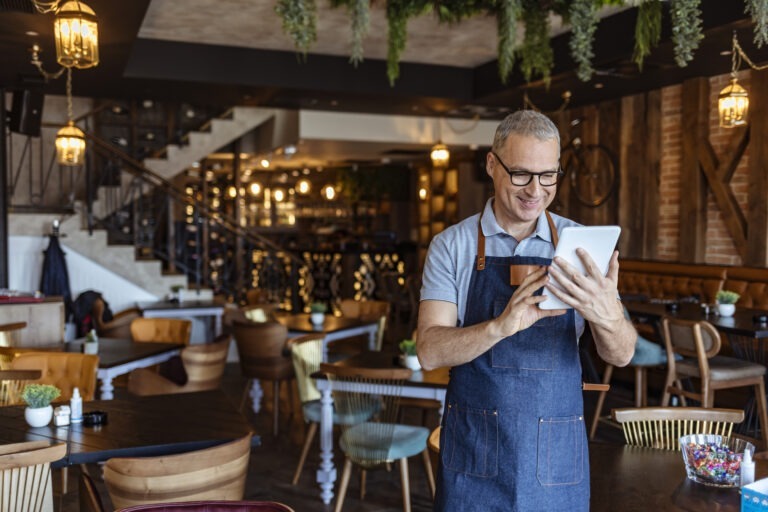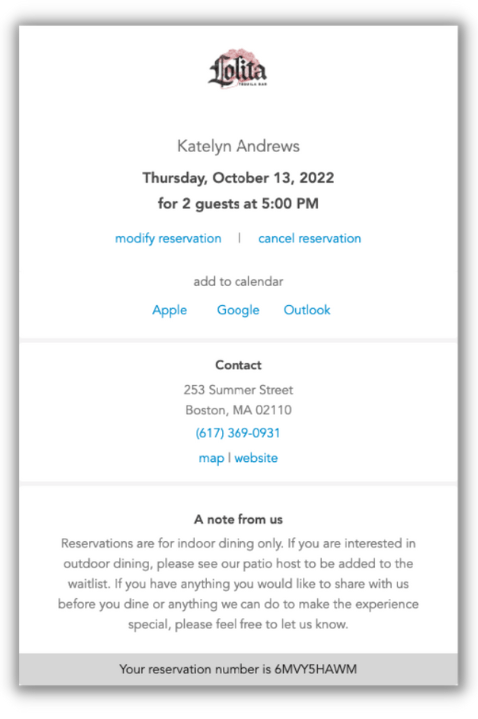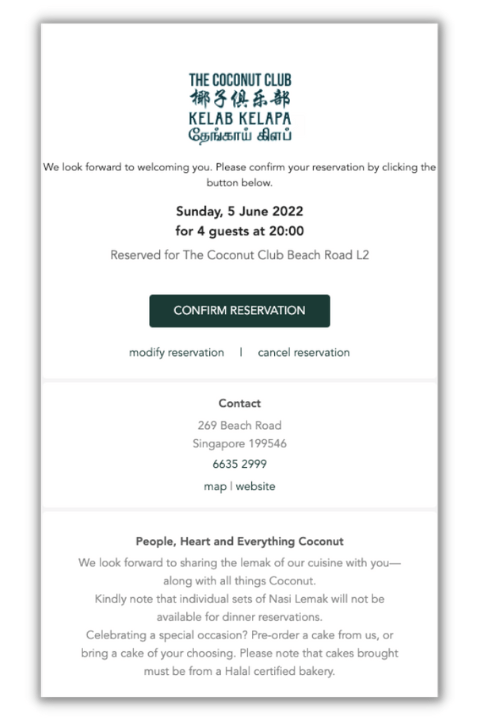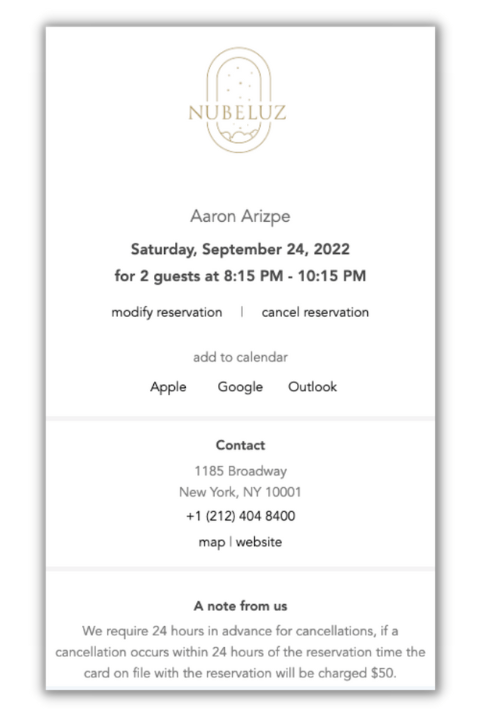Restaurant Reservation Email Tips: Boost Retention & Reduce No-Shows
Sevenrooms
5 min read
Nov 16, 2022

Sevenrooms
5 min read
Nov 16, 2022

After more than two years of restrictions, diners are hungry to return to their favorite restaurants. In fact, this demand for on-premise dining has led to a 107% increase in searches for reservations online.
In many ways, the online reservation shift has been a boon for the industry. However, the ease of booking digitally has created more opportunities for no-shows and cancellations leaving restaurants with empty seats.
To ensure your guests are showing up for dinner, it’s important to optimize every step of their booking journey. From the moment they click “reserve” your communication should be consistent starting with the reservation confirmation email.
Restaurant reservation confirmation emails are the unsung heroes of the online booking industry. There’s more to these messages than simply verifying party size and reservation time and date. When optimized, confirmation emails can set expectations, reduce no-shows, upsell and create a better guest experience.
This guide to restaurant reservation confirmation emails we’ll cover everything you need to turn confirmations into a powerful tool.
Reservation confirmation emails are one of the most underrated tools in the hospitality industry. These small-but-mighty missives help restaurant operations run smoothly and increase sales.
Confirmation emails combat no-shows by giving guests written documentation of their reservation. Restaurant reservation solutions offer features that give customers the extra nudge they need to remember to show up.
For example, you can embed links in confirmation emails that make it easy for guests to add bookings to their calendars. And, automated reminders let you email or SMS guests closer to their reservations.
If after these reminders a guest is no longer able to make their reservation, confirmation emails give them an easy way to modify or cancel the booking.
Easy modification options let restaurants recover customers who aren’t able to stick to their original plans. And, cancellation options let guests notify restaurants that they can’t make it so staff can free up those tables for other bookings or for walk-in parties.
Reservation confirmation emails keep guests accountable by reminding them of their bookings. When you know who’s coming to your restaurant and when your team can be better prepared to serve them.
For example, you can staff appropriately by scheduling the right number of servers on any given day. And, when your reservations system is linked to your customer relationship management (CRM) solution, servers can access guests’ profiles and provide personalized service, such as by recommending menu items that suit a customer’s dietary preferences.
Restaurant reservation confirmation emails reduce booking errors made by both guests and staff.
Mistakes are inevitable when reservations are made over the phone. Hosts can easily mishear guests and book a table for the wrong date, party size or time. When guests make their own reservations online, errors are less likely to occur.
When customers receive immediate confirmation of a booking via email, they can verify that the reservation they requested is the one they intended to make. For example, if a customer wanted a table for Friday but accidentally booked one for Saturday, they’ll be able to see this mistake in the confirmation email and easily fix it by amending the booking online.
Confirmation emails give you an opportunity to upsell to guests before they’ve even arrived at your restaurant. For example, you can include offers to upgrade to a prepaid prix fixe menu or add a bouquet of roses to the meal to mark a special occasion.
A secondary benefit of reservation confirmation emails is that they keep guests engaged by helping your restaurant stay top of mind. If your emails include links to your restaurant’s social media platforms, guests can follow you on their favorite channels.
If by now you’re itching to revisit your current template, first make sure it includes these elements:
To learn more about how to create and launch successful marketing emails, download our Email Marketing Guide.

Need a little inspiration? Here are examples of restaurants that knock it out of the park when it comes to reservation confirmation emails.
This email from Boston’s Lolita Tequila Bar has all of the elements of an effective restaurant reservation confirmation. It begins with the most important details: the restaurant’s logo, the guest’s name, reservation date, party size and time. Then it gives the guest options to modify or cancel the booking, and add it to their calendar.
Next up is the restaurant’s address, phone number, map link and website link. The address is especially important here because the restaurant used to have two locations in Boston, so underscoring the address of the location that remains avoids confusion.
Below that, there’s a note from the restaurant explaining that reservations are only for indoor dining. The note also encourages guests to reach out if they need any assistance, which is a sign of good hospitality.
Finally, there’s a confirmation number, which makes it easy for the restaurant to look up the booking in their internal system.

Singaporean restaurant the Coconut Club also knows how to make the most of its reservation confirmation emails.
Their confirmation emails begin with the reservation details and the restaurant’s address. Then, it asks guests to confirm the booking with a clear call to action and a high-contrast button. Asking guests to do this is another tactic for reducing no-shows. Guests can also modify or cancel their booking if needed.
The email ends with a note from the restaurant that sets expectations for the meal. There’s also an upselling plug for birthday cakes.

New York City’s Nubeluz has all of the essentials of a good confirmation email: the guest’s name, reservation details, options to modify or cancel, calendar options and the restaurant’s contact information.
What’s unique here is that they also include their cancellation policy, which states that if guests cancel less than 24 hours before the reservation, they’ll be charged a $50 fee. This statement sets expectations for guests and encourages ample notice for cancellations.

Follow these best practices to make your restaurant reservation confirmation emails do the heavy lifting so you don’t have to.
We recommend sending one confirmation email as soon as the reservation has been made, one reminder the day before the reservation and another one on the day of the booking.
Even with reminder emails, guests sometimes need an extra nudge to ensure they show up. You can call guests the day of their booking to remind them, or you can forgo this step altogether with automation from a reservation solution like SevenRooms.
The day before or of the booking, you can send guests an email or SMS asking them to confirm the reservation by clicking a button or responding.
Automations like this reduce the time a host or manager needs to spend making these calls. It frees them up to focus on high-value tasks, which is critical during a labor shortage.
Check in with cancellations to get them to rebook. Keep those guests on your email list (with permission) and send them marketing emails to stay top of mind.
When everything goes according to plan, confirmation emails not only ensure guests show up when they say they will but help set expectations for the dining experience. Your work, however, isn’t over after the meal. How you follow up can turn first-time visitors into regulars and help you collect reviews.
Send guests emails after a meal to thank them for their visit and ask for feedback. SevenRooms helps you capture feedback fast with post-meal surveys. If a guest responds positively, ask them to write a review. If a guest responds negatively, follow up directly to make it right. This is your opportunity to turn first-time visitors into loyal regulars.
Learn how SevenRooms can help you implement these confirmation email best practices with our Email Marketing and Automation Solutions. Book a demo today.
A reservation confirmation email should include personalization elements such as the guest’s first name as well as their chosen booking date, time, and party size. Include restaurant details like the address and contact phone number and options to modify or cancel the reservation. Lastly, you can include reservation policies, notes, and up-selling opportunities.
Reservation confirmation emails can help reduce no-shows, give guests the flexibility to modify their reservations and create opportunities for up-sells and add-ons.